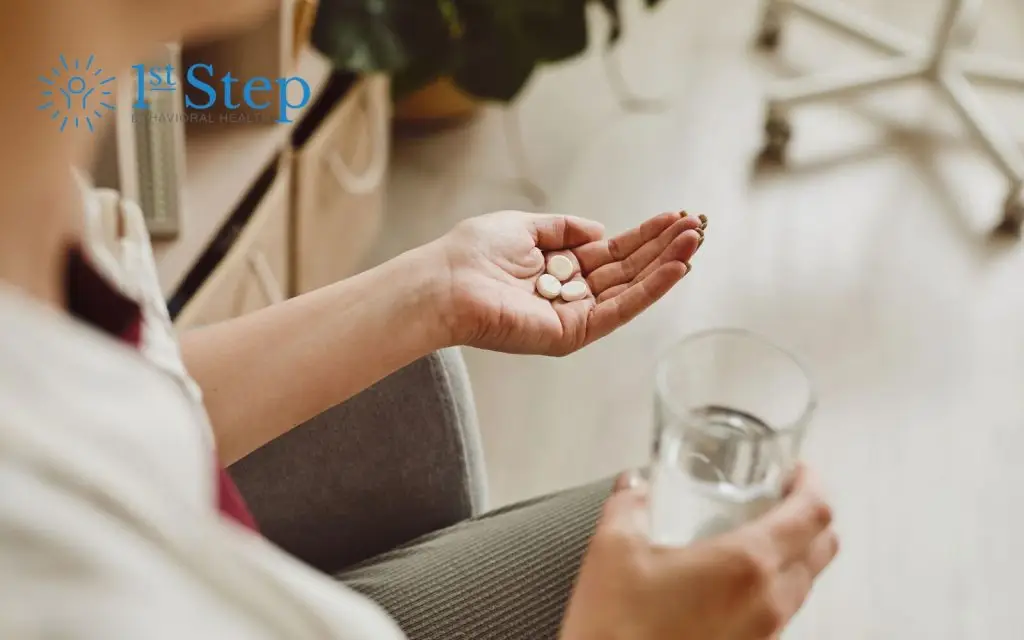Millions of people in the United States use prescription drugs. These drugs can help people manage the symptoms of medical or mental health conditions. Some prescription medications have the potential for misuse and addiction. People who become addicted to prescription drugs often require treatment and continuing support to recover and maintain sobriety.
Ativan (lorazepam) is a commonly prescribed benzodiazepine people can take to manage anxiety, seizures, and other conditions.[1] It is highly addictive, and people who abuse it may become physically dependent on it.
This article will explore Ativan abuse and addiction. You will learn:
- What Ativan treats
- The side effects and risks of Ativan
- How to recognize Ativan abuse and addiction
- What to expect during benzodiazepine addiction treatment
- Where to find treatment and support
If you or someone you love struggle with substance abuse or addiction, you are not alone. Contact the First Step Behavioral Health team to explore your treatment options or find support.
Our intake specialists can answer your questions. They will also verify your insurance details and schedule an intake appointment as quickly as possible. Start your recovery journey by contacting First Step Behavioral Health today.
What is Ativan?
Ativan is the brand name of a drug called lorazepam. Lorazepam is a benzodiazepine drug with potential for misuse and addiction.
Ativan slows central nervous system (CNS) activity. It can reduce anxiety and other symptoms related to mental health and medical conditions. Doctors may prescribe Ativan to help patients manage the symptoms of several conditions, including:[2]
- Anxiety disorder
- Panic disorder
- Bipolar disorder
- Alcohol withdrawal
- Nausea from chemotherapy
- Muscle spasms
- Agitation
- Seizures
- Insomnia
Because Ativan and other benzodiazepines can be addictive, doctors typically only prescribe them for short-term use.
The Effects and Risks of Ativan
Benzodiazepines like Ativan reduce CNS activity. People who take Ativan may feel calm and sedated. Some people may like the desirable effects of Ativan and may misuse it. Over time, people may develop a physical dependence on Ativan.
Ativan abuse also puts people at risk of an overdose. An overdose may occur if someone takes an excessive dose of Ativan. Symptoms of an Ativan overdose include:[3]
- Excessive drowsiness
- Confusion
- Slurred speech
- Lethargy and fatigue
A life-threatening Ativan overdose is rare. However, combining Ativan and other substances, including other benzos or alcohol, can be life-threatening. Signs of an overdose involving Ativan and other sedatives include:
- Extreme sleepiness and loss of consciousness
- Slow, shallow, or stopped breathing
- Loss of muscle control
- Coma
- Death
An Ativan overdose is a life-threatening medical emergency. If someone near you is experiencing an overdose, call 911 immediately. Wait with the person until EMS arrives.
People who take prescription Ativan must follow their doctor’s directions to avoid overdose. Those taking it recreationally must seek Ativan addiction treatment and support to stop using it.
Symptoms of Ativan Addiction
People may develop an Ativan addiction after using the drug as a prescription while treating anxiety. Some may also develop dependence after using it recreationally (without a prescription).
Ativan addiction can cause severe, long-term effects and may become life-threatening. It is essential to seek treatment as quickly as possible to avoid severe complications.
Some common signs of Ativan addiction include:
- Experiencing physical symptoms of Ativan abuse, like dizziness, nausea, weight loss, confusion, and tremors
- Taking higher or more frequent doses of Ativan than prescribed
- Wanting to stop using Ativan but finding it is impossible without professional support
- Falling behind at work, school, or home
- Needing to use more Ativan to get the desired effects
- Spending a lot of time and energy getting, using, and recovering from using Ativan
- Having cravings for Ativan
- Experiencing withdrawal syndrome if they stop taking Ativan
- “Doctor shopping”–having multiple prescriptions for Ativan from more than one doctor
People with a substance use disorder (SUD) often require a professional treatment program. Comprehensive treatment plans typically include a medical detox program to stop using Ativan safely.
Treatment for Ativan Addiction
Substance use disorder (SUD) treatment occurs in stages. People with Ativan addiction often require comprehensive treatment in a professional treatment center to recover.
Treatment for Ativan addiction may consist of:
- A medically supported detox program consisting of medications, mental health care, and supervision
- Individual counseling
- Behavioral therapies, including cognitive behavioral therapy (CBT)
- Group therapy
- Family therapy
- Relapse prevention education
- Nutrition support, art therapy, mindfulness, exercise, and other holistic therapies
- Aftercare planning
People may participate in inpatient treatment or outpatient rehab programs. The level of care someone requires depends on the severity of their addiction and other factors.
Before beginning a detox or treatment program, people must undergo an evaluation. This evaluation will determine which level of care is appropriate and help the team create an effective course of care.
Find Treatment for Ativan Addiction
Comprehensive addiction treatment can help people regain control over their health and prevent relapse. If you or someone you love struggles with Ativan addiction, you are not alone. Effective, compassionate treatment is available at First Step Behavioral Health.
References:
- Food and Drug Administration (FDA): Ativan (lorazepam) Tablets
- National Alliance on Mental Illness (NAMI): Lorazepam (Ativan)
- National Institutes of Health (NIH): Benzodiazepine Toxicity

